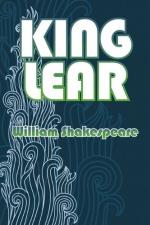|
|
King Lear Act 3, Scene 4
Back in the storm, the intensity of the scene is enormous. Kent begs Lear to enter the haven, but the king swears he isn't bothered by the fierceness of nature.
"'Good my lord, enter here.'
'Will it break my heart?'
'I had rather break mine own.'" Act 3, Scene 4, lines 4-5
He sends Kent and the Fool into a shelter and tells them he will remain outside for a moment to pray.
Lear prays. He tells Kent and the Fool to momentarily leave him alone:
"Prithee, go in thyself; seek thine own ease.
This tempest will not give me leave to ponder
On things would hurt me more. But I'll go in.
In boy; go in first. You houseless poverty--
Nay, get thee in. I'll pray and then I'll sleep." Act 3, Scene 4, lines 23-27
Lear is compassionate in this scene, showing his ability to care for others. Suddenly, he seems approachable. He reminds himself of his own errors.
"How shall your houseless heads and unfed sides,
Your looped and windowed raggedness, defend you
From seasons such as these? O, I have ta'en
Too little care of this! Take physic pomp,
Expose thyself to feel what wretches feel." Act 3, Scene 4, lines 30-34
For the first time in the play, he feels his own frailties and limitations and notes them.
Edgar comes out in this scene, dressed as a beggar. Edgar is pretending to be a madman as a disguise and a ploy to become Lear's confidante. He calls himself "Poor Tom" and "Tom O'Bedlam".
Topic Tracking: The Natural Order 11
Lear relates to Edgar's madman rantings, showing how far he has fallen from his lofty status as king:
"Why, thou wert better in thy grave than to answer with thy uncovered body this extremity of the skies. Is man no more than this? Consider him well. Thou owest the worm no silk, the beast no hide, the sheep no wool, that cat no perfume. Ha! Here's three on's are sophisticated! Thou art the thing itself, unaccommodated man is no more but such a poor bare, forked animal as thou art. Off, off, you lendings! Come unbutton here." Act 3, Scene 4, lines 98-105
Lear asks Edgar the biggest question of the play: "Is man no more than this?" (line 99) Lear is showing a new kind of awareness here, asking himself new questions and searching for new answers. Once he notices Edgar's hideous rags, he begins to tear off his own clothes to come closer to Edgar's state of the unaccommodated animal. At this point, he sees no difference between man and beast.
Lear is making progress unclothing himself when Gloucester arrives. Gloucester asks Edgar who he is, and he responds:
"Poor Tom, that eats the swimming frog, the toad, the tadpole, the wall-newt and the water, that in the fury of his heart, when the foul fiend rages, east cow-dung for sallets, swallows the old rat and the ditch-dog, drinks the green mantle of the standing pool; who is whipped from tithing to tithing and stock-punished, and imprisoned; who hath had three suits to his back, six shirts to his body,
horse to ride and weapon to wear;
But mice and rats, and such small deer,
Have been Tom's food for seven long year." Act 3, Scene 4, lines 123-133
Gloucester and Kent take Lear inside, but Lear refuses to go without his "philosopher," Poor Tom (Edgar). They all leave together.




